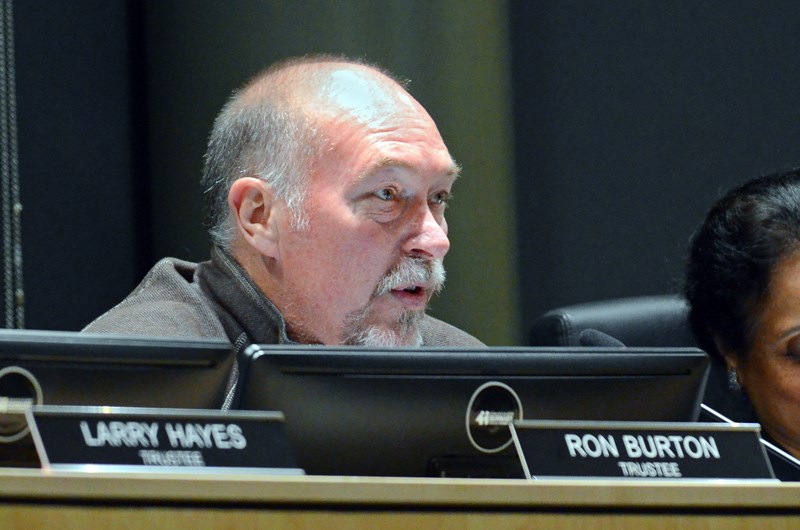Last week’s Supreme Court ruling in favour of the B.C. Teacher’s Federation was a “great moment for collective bargaining in the public sector” according to Burnaby school board chair Ron Burton, but its financial implications could be “huge,” and downloading the costs onto school districts would be catastrophic, he says.
“I’d say there’s always concern from the board when money’s involved,” Burton told the NOW Tuesday. “If (Premier Christy Clark) tries to download it, it will just be a nightmare. You saw what happened in Vancouver just because of the kind of cutbacks to date. If they try to download this now, it would bankrupt virtually every school board in the province.”
The Supreme Court’s 7 to 2 landmark ruling marked the end of a legal battle that began in 2002, when the new majority B.C. Liberal government passed legislation that deleted from the teachers’ contract sections about class size, the number of special needs students who can be in a class and the number of specialist teachers – like teacher librarians – required in schools.
Friday’s ruling restored those provisions, and the BCTF and the province will now have to reopen the collective agreement negotiated after a six-week strike in 2014 to hammer out an agreement on them.
“Our position on reopening is we go back to the language we had,” said Rae Figursky, BCTF executive member and two-time past president of the Burnaby Teachers’ Association.
In 2014, the B.C. School Trustees Association estimated it would cost more than $1 billion a year to return to pre-2002 service levels, mostly because of how many more teachers would have to be hired.
Figursky, a teacher at Alpha Secondary, said Friday’s ruling was an emotional one for her and fellow teachers.
“I cried,” she said. “Students couldn’t figure out why staff were so happy, so I was telling them and I was crying, and then on and off all night I was crying. It’s 14 years of kids who lost out on so much.”
Her sentiments were echoed by Mondee Redman, who was Burnaby’s school board chair when the teachers’ contract was stripped and who has been watching the legal battle closely.
"They worst part of what they did was the kids on the margin, lost, because we had to cut back a lot of programs with the way they did the funding,” she said. “All I can think of is so much time was lost. They were told at the time it was wrong. This is a keystone of Canadian democracy and for what point? So they can call themselves the lowest tax jurisdiction.”
Redman said Burnaby’s 2002 board opposed bills 27 and 28 and other decisions by then-Education Minister Christy Clark.
The former chair said Burnaby was joined by many other boards across the province, including the traditionally more right-leaning Surrey board – then chaired by Mary Polak, now Clark’s minister of environment.
“It was to the point where myself and the board chair from Surrey would get up and say, ‘You know what, when Surrey and Burnaby agree on something, you know the education minister is wrong.’”
Burton, who was a trustee in 2002, remembers the board taking a stand.
“Our board took the position that it was unethical,” he said. “At the time, our big thing was that they’d negotiated a contract, and once you’ve negotiated, you can negotiate it out, but you can’t just say we’re tired of it and we don’t want to spend the money.”
Clark has told reporters the government set aside $100 million in anticipation of the court decision, and negotiations with the teachers' union will start soon.
In a statement after the ruling, Finance Minister Michael de Jong said the province welcomed the direction from the Supreme Court because it addressed “uncertainty in labour relations.”
“We are committed to working constructively with the BCTF to keep making our classrooms better," he said.



